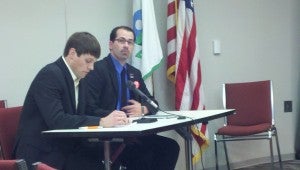If you already read my colleague Mandy Warner’s blog, you know that I had the great honor of representing EDF in Chicago last Thursday at one of the Environmental Protection Agency’s (EPA) hearings for its first-ever proposed carbon pollution standards for new power plants.
It was a day that will always stand out as a milestone in my life.
And, now that I’ve had the Memorial Day weekend to reflect on everything that happened, I wanted to share some of the stories I heard and the fascinating details I noticed.
Here’s what the Chicago hearing looked and felt like:
It was a day of incredible support for EPA’s efforts to control carbon pollution in America. I watched dozens of people testify, and give EPA a symbolic “standing ovation” for taking such a historic step.
In fact, there was such support around the Midwest that EPA had to open a second concurrent hearing room to accommodate all of the speakers – just like at the D.C. hearing.
(That’s no surprise. States and cities across the Midwest are carrying out homegrown clean energy solutions that strengthen economic prosperity and job creation, improve our energy security, and provide a healthier environment. You can read more in this new paper [PDF]that examines some of the clean energy policies put in place in Illinois, Iowa, Minnesota and Wisconsin — and the associated private sector economic activity.)
Back to Chicago, and the day of the hearing:
In the early morning, the room was slow to fill up — primarily because the huge line of people who wanted to get in had to wait through delays as everyone went through a metal detector.
By about 9:00 a.m., a steady stream of people was filtering into the room from towns around Illinois, Michigan, Iowa, Indiana and Wisconsin.
Those people were concerned citizens with a variety of backgrounds: nurses; doctors; ecologists; physicists; economists; union workers; veterans; parents; grandparents; business leaders and students.
And, almost without exception, all of these people spoke in favor of EPA’s common sense proposal to reduce the huge amount of carbon pollution emitted from fossil fuel power plants.
In fact, during the almost eight hours I spent listening to testimony, I only heard one person speak against EPA’s proposed standards. Clean air advocates carried the day by a wide margin.
Because I work for EDF, I testified about how carbon pollution and climate change are critical issues for the protection of human health and our environment. You can read my full testimony here [PDF].
But others’ testimony reminded me how much those issues affect every aspect of our lives.
People spoke about carbon pollution as a national security issue, an economic problem and a spiritual issue, as well as a public health and environmental threat.
I heard scores of personal and moving stories about how air pollution impacts people’s lives.
There were heart-wrenching moments when mothers and fathers talked about watching their children struggle to breathe because of asthma or other lung diseases.
One elderly woman held up a photograph of her grandson and talked about his difficulty breathing and need to carry a nebulizer on his hip at all times. The audience gave her a rousing ovation.
Asthma attacks can be triggered by ozone pollution, and the warmer temperatures caused by climate change mean we’ll have more ozone pollution.
That’s one reason why EPA’s proposed standards for carbon pollution are so important. They’ll cut the amount of climate-destabilizing carbon pollution emitted by new coal-fired power plants in half, compared to traditional plants.
The crowd at the Chicago hearing seemed to know that. What I took away from the hearing were the messages of hope, excitement, and opportunity.
The day was definitely a resounding victory for clean air.










